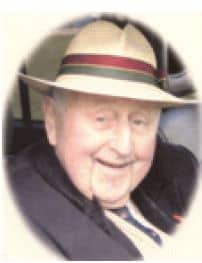The Rev Rex Hancock, born 9 May 1928, died 18 September 2012.

Scion of a brewing family who combined a career as a country parson with a passion for horses and hounds.
The Reverend Rex Hancock, who died aged 84, was fond of saying: “The Church, the cavalry and the chase are my three loves – but I never know in which order.”
In the spring of 2012, the Devon and Somerset Staghounds, of which Hancock’s parents had been masters in the Thirties and Forties, gave a special meet at Larkbarrow Corner to celebrate his 50 years in Holy Orders.
It was attended by the masters, 200 followers, and clergy from the hunting St Hubertus Club of interdenominational clerics, of which he was a lifelong member. Hancock blessed the hounds on this occasion, as he did often.
In 2003, when the BBC television series A Country Parish visited Wiltshire, the incumbent vicar Jamie Allen declined to bless the hounds on the orders of the bishop. It was Hancock who stepped into the breach.
On another occasion, Hancock was called before George Carey, later Archbishop of Canterbury but then Bishop of Bath and Wells, after being overheard using intemperate language. “I got off lightly,” recalled Hancock. “After all, we had been at the same crammers together.”
Reginald Legassicke Hancock (always known as Rex) was born on May 9, 1928 at Norton Fitzwarren in Somerset. The family later moved to Rhyll Manor, near Dulverton. During the war, the hounds were looked after by his mother and two other redoubtable Exmoor ladies (“If they had been men, they would have been generals,” Hancock said).
Educated at Winchester, he went on to Trinity College, Cambridge, where he read History and was master of the Trinity Foot Beagles; he used to say that he had “a first-class degree in kennel management”.
His kennel huntsman there was Robert Foreman Gloate, Foreman after his father’s favourite hound. It was a habit Hancock would continue at christenings, and when parishioners could not think of a name for their child he would get out the Foxhound Kennel Studbook.
In the early 19th century Hancock’s family had established, at Wiveliscombe, the largest brewery in the south-west, and Rex was a bachelor of independent means. He was ordained in 1960, and for two years served as curate of Christ Church, north Finchley.
One of his mentors was the controversial Bishop of Woolwich and author of Honest to God, John Robinson, who instilled in him the belief that if God was not “up there” at least he was “outthere”. “Hunting has got nothing to do with the law,” Hancock once said. “We hunt fox and deer by the Grace of God.”
In August 1963 Rex was commissioned as a Chaplain to the Forces (CF), where he spent the next 20 years with spells as Padre to many of our Regiments throughout the UK, BAOR, Cyprus, Sharjah and Bahrain.
He was padre with the The Queen’s Own Hussars and the Queen’s Royal Irish Hussars before their amalgamation in 1993.
Stationed in Northern Ireland in the late 1960s, he managed to get several days’ leave to hunt with the Galway Blazers, then under the mastership of Captain Brian Fanshawe, Roman Catholic clerics whom he met on the hunting field delivered the verdict: “He rides quite well for a Protestant.”
In 1982 Hancock began 11 years as rector of Quantox Head and seven parishes on Exmoor. He was much in demand to give funeral addresses, some people even writing into their wills that he should be selected for the task.
To the end of his life Hancock followed the staghounds, the Exmoor foxhounds and the Minehead harriers. His riding career came to an end at the age of 72 when he broke his ankle while conducting a funeral. “You got away this time, but I’ll get ‘e in the end.” The undertaker told him at the time.
Hancock was generous with both his time and his home, Stowleys, near Watchet; every year the Watchet Town Brass Band performed in his four-acre garden to raise funds for charity. His favourite flowers were his old English roses, and his favourite songs the theme tunes to Aces High and The Dam Busters. He took much pleasure in conducting the Band for the Dam Busters.
At his own expense, Hancock restored the pretty Exmoor church at Lilstock St Andrew, and it had been his intention to be buried there. Shortly before he died, however, he changed his mind and decided to be buried in Porlock, on what was to be the 51st anniversary of his ordination. “I want to be amongst my friends,” he said.


